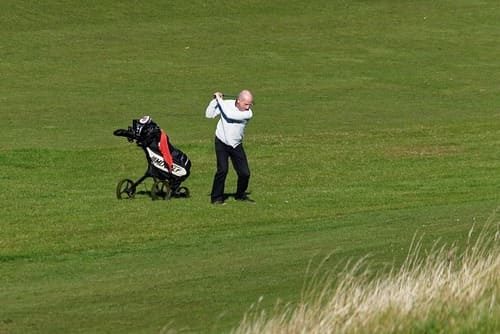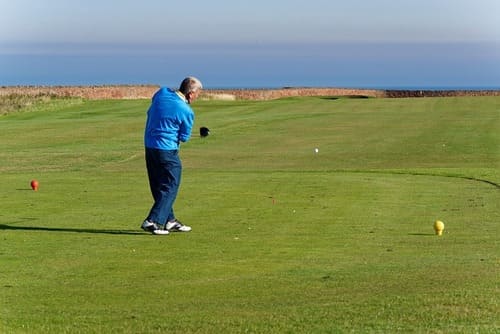“Drive for show, putt for dough,” they say, and when it comes to golf, age is just a number. But wait, what age is too old to tee it up as a senior golfer? You might think that once you’ve crossed a certain threshold, it’s time to trade your driver for a rocking chair. Well, think again!
Golf is the game of a lifetime, and as the fairways wind through the rolling greens, they don’t discriminate based on your age. Whether you’re a spry septuagenarian, a fabulously fit fifty-something, or a dynamic duo well into your golden years, the golf course is your playground, and there’s no age limit to the fun, the challenge, and the camaraderie it offers.
In this blog post, we’re going to shatter the myth that golf is just for the young bucks and explore the intriguing question: What age is a senior golfer? So, put away that rocking chair for now, grab your favorite golf hat, and get ready for a thrilling ride through the fairways of age-defying enthusiasm and wisdom. Age is no handicap when it comes to the game we all love, and together, we’re going to prove that golf truly knows no bounds. Ready to swing into the world of senior golf? Let’s get started!
Defining a Senior Golfer
As golfers age, their priorities and abilities on the golf course often shift. A senior golfer can be broadly defined as an individual who has reached a certain age where they may face unique physical and mental challenges while playing the game. While there is no universally accepted age range that explicitly categorizes senior golfers, it is commonly understood that these individuals are typically in their golden years, often beyond the age of retirement.
Determining the age range for senior golfers can vary depending on different factors such as geographical location, cultural norms, and personal preferences. In some cases, senior golfers may be considered those who are 50 years old and above, while in other instances, the age range might start at 55 or 60. Ultimately, the term “senior golfer” serves as a description rather than a strict definition, highlighting the specific age group that tends to encounter specific challenges and considerations on the golf course.
Determining the age range for senior golfers
When it comes to determining the age range for senior golfers, there is no one-size-fits-all answer. While some may argue that the age of 50 marks the beginning of the senior golfer category, others may suggest that it is closer to 55 or even 60. Age alone cannot be the sole determinant, as individuals age differently and possess varying physical abilities. Factors such as overall health, fitness level, and golfing experience also play a significant role in determining when someone may transition into the senior category. Therefore, it is essential to consider a combination of age and individual circumstances to accurately define the age range for senior golfers.
Recognizing the diversity among senior golfers, golfing communities and organizations have embraced a more inclusive approach by utilizing age brackets to cater to the varying needs and abilities of older adults. These brackets often span over five to ten years, accommodating those who may have started playing golf later in life or experienced physical changes that impact their gameplay. This approach acknowledges that age is just one aspect of the puzzle and allows senior golfers to find camaraderie and competition within a group that best suits their skills and capabilities.
Physical considerations for senior golfers
Strength and flexibility are important physical considerations for a senior golfer as they age. As we get older, our muscles tend to weaken and become less flexible, which can affect our golf swing and overall performance. Regular exercise that focuses on strength and flexibility, such as resistance training and stretching, can help senior golfers maintain or improve their physical abilities on the golf course.
It is also important for senior golfers to warm up properly before playing, as this can help prevent injuries and improve overall performance. Stretching exercises that target the muscles used in the golf swing, such as the shoulders, back, and hips, can help senior golfers maintain their range of motion and reduce the risk of strain or injury during the game.
In addition to strength and flexibility, balance is another key physical consideration for senior golfers. As we age, our balance tends to decline, making it more challenging to maintain a stable and controlled stance during the golf swing. Regular balance exercises, such as standing on one leg or using a balance board, can help senior golfers improve their stability on the golf course.
It is also important for senior golfers to choose the right footwear that provides good traction and support, as this can help prevent slips and falls while walking on uneven terrain. By addressing these physical considerations and incorporating appropriate exercises into their routine, senior golfers can maintain their physical capabilities and enjoy the game for years to come.

Mental challenges faced by senior golfers
Many senior golfers face various mental challenges when playing the game. One of the most common mental challenges is maintaining focus and concentration throughout the round. As we age, it becomes more difficult to stay mentally sharp for extended periods, which can affect our ability to make accurate shots and strategic decisions on the golf course.
Additionally, senior golfers may also struggle with dealing with the pressure and stress that often accompanies competitive golf. The desire to perform well and meet high expectations can lead to feelings of anxiety and self-doubt, which can negatively impact their overall performance.
Benefits of golfing for older adults
A senior golfer can experience a plethora of benefits to both physical and mental well-being as they age. Firstly, golf is a low-impact sport that allows seniors to maintain a certain level of fitness without putting excessive strain on their joints. The walking involved in playing golf provides an excellent cardiovascular workout, helping to improve endurance and overall fitness.
Additionally, swinging a golf club involves using various muscle groups, which can contribute to increased strength and coordination. These physical benefits not only promote a healthier lifestyle but also enhance mobility and balance, reducing the risk of falls and injuries commonly associated with aging.
Furthermore, golfing offers valuable opportunities for social interaction and mental stimulation. Senior golfers often join golf communities or clubs, which provide a supportive environment for meeting and connecting with like-minded individuals. This social aspect fosters friendships and a sense of belonging, helping to combat feelings of isolation or loneliness that can sometimes accompany aging.
Moreover, the mental challenges presented by golf, such as strategizing shots, assessing distances, and adapting to changing conditions, provide mental stimulation and can improve cognitive functioning. These cognitive benefits contribute to maintaining mental acuity and may even play a role in reducing the risk of age-related cognitive decline.
Common misconceptions about senior golfers
There are several common misconceptions about senior golfers that seem to persist despite evidence to the contrary. One of the most prevalent misconceptions is that senior golfers are not as skilled or competitive as their younger counterparts. On the contrary, many senior golfers have years of experience, dedication, and a strong passion for the game, making them formidable opponents on the course. Age does not define their ability to perform well; instead, it is their knowledge, technique, and strategy that contribute to their success.
Another misconception is that senior golfers are not physically capable of playing the game at a high level. While it is true that age may bring some physical limitations, such as decreased flexibility or strength, many senior golfers have learned to adapt their game to accommodate these changes. They utilize various strategies and techniques to compensate for any physical challenges they may face, ensuring that their performance remains strong. It is important to recognize and appreciate the resilience and determination of senior golfers, as they continue to showcase their skills and defy the stereotypes associated with aging.
Adapting the game for senior golfers
One of the key aspects of promoting inclusivity and ensuring that senior golfers can continue enjoying the game is by adapting it to their needs and capabilities. This can involve various adjustments and modifications to accommodate their physical abilities, as well as considering their level of experience and skill. Adapting the game for senior golfers helps to create an environment where they can fully participate and experience the joy of golf.
One way to adapt the game for senior golfers is by adjusting the course setup. This can involve setting up tees closer to the hole, creating shorter and more manageable distances for senior golfers to drive the ball. Additionally, it may be beneficial to remove or modify certain hazards on the course, such as bunkers or water hazards, to decrease the level of difficulty and make the game more enjoyable for senior players. By adapting the course setup, senior golfers can continue to engage in the sport and maintain their passion for the game without feeling overwhelmed or discouraged.
Tips for senior golfers to improve their game
In order to enhance their golf game, senior golfers can consider a few helpful tips. Firstly, it is crucial for senior golfers to focus on proper warm-up exercises before hitting the course. Stretching the muscles and joints, especially the back and hips, can prevent injuries and increase flexibility. Additionally, incorporating strength and flexibility training into a regular exercise routine can improve balance and power in the swing, leading to better overall performance on the course.
Another valuable tip for senior golfers is to strategize and play strategically. Older golfers may not have the same power and stamina as their younger counterparts, so it is important to play smarter rather than relying solely on strength. This can include approaches such as selecting the appropriate club based on distance and accuracy, as well as employing a careful game plan for each hole. By using strategic thinking and adapting their game to their capabilities, senior golfers can maximize their potential and enjoy a more fulfilling golfing experience.

Age-related equipment considerations for senior golfers
As senior golfers continue to enjoy the game well into their later years, it is essential to consider age-related equipment considerations. One of the most important factors to keep in mind is the flexibility and strength of the golfer’s swing. With age, flexibility tends to decrease, making it crucial to select the right equipment that aids in maintaining a consistent swing. Senior golfers should opt for graphite shafts, which are lighter and more flexible than steel. These shafts can help generate more clubhead speed, resulting in improved distance and accuracy. Additionally, clubs with higher lofts and larger sweet spots can assist senior golfers in achieving better ball contact and more forgiving shots.
Another critical aspect to consider for senior golfers is the grip size. As the hand strength diminishes with age, having a grip that offers better control and comfort is vital. Grips that are slightly larger in diameter or have softer materials can provide a more secure hold and prevent slipping during the swing. Furthermore, utilizing grip aids such as oversized grips or grip-enhancing gloves can offer additional support and stability. By choosing equipment that caters to the unique needs of senior golfers, players can continue to enjoy the sport while maximizing their performance on the course.
Promoting inclusivity and camaraderie among senior golfers
Golf is not just a game; it is a way to foster inclusivity and camaraderie among senior golfers. It provides an opportunity for older adults to connect with others who share their passion for the sport. By participating in golfing events and joining clubs, senior golfers can build meaningful relationships and create lasting memories on the greens. The social aspect of golfing allows them to interact with people of all backgrounds and abilities, promoting a sense of community and belonging among senior golfers.
In addition to socializing, golfing provides a platform for senior golfers to support and motivate each other. Whether through friendly competition or offering words of encouragement, senior golfers can inspire one another to improve their game and overcome challenges. This supportive environment fosters a sense of camaraderie among senior golfers, creating a bond that goes beyond the golf course. The shared experiences and shared love for the game create a strong sense of unity and mutual respect among senior golfers, contributing to the promotion of inclusivity and camaraderie within the golfing community.
FAQs
What is considered a senior golfer?
A senior golfer is typically defined as an individual who is of retirement age or older and actively participates in the sport of golf.
What age range qualifies someone as a senior golfer?
While there is no strict age limit, senior golfers are generally considered to be individuals aged 50 and older. Some golf clubs and tournaments may have specific age requirements or divisions.
What physical considerations should senior golfers keep in mind?
Senior golfers may need to take into account their physical limitations, such as reduced strength, flexibility, and stamina. It is important to warm up properly, use appropriate equipment, and consider modifications to accommodate any physical challenges.
What mental challenges do senior golfers face?
Senior golfers may experience mental challenges such as decreased focus and concentration, increased self-doubt, or difficulty handling pressure. Developing mental resilience and strategies for staying focused can greatly benefit senior golfers.
What are the benefits of golfing for older adults?
Golfing provides numerous benefits for older adults, including physical exercise, social interaction, mental stimulation, and the opportunity to enjoy nature. It can also contribute to overall well-being and a sense of purpose.
What are some common misconceptions about senior golfers?
One common misconception is that senior golfers are not as skilled or competitive as younger players. However, many senior golfers possess a wealth of experience and skill. Another misconception is that the sport is too physically demanding for older adults, but with proper adaptations, seniors can continue to enjoy golf.
How can the game be adapted for senior golfers?
The game can be adapted for senior golfers by using shorter tees, utilizing golf carts, and implementing modified rules or formats. These adaptations can help accommodate physical limitations and enable seniors to continue playing the sport.
What are some tips for senior golfers to improve their game?
Some tips for senior golfers to improve their game include focusing on proper technique, staying physically active and fit, practicing regularly, seeking professional instruction, and maintaining a positive mindset.
What age-related equipment considerations should senior golfers keep in mind?
Senior golfers should consider using equipment that is specifically designed for their age group, such as clubs with lighter shafts and larger sweet spots, as well as golf balls with lower compression. These types of equipment can help maximize performance and minimize the impact on the body.






